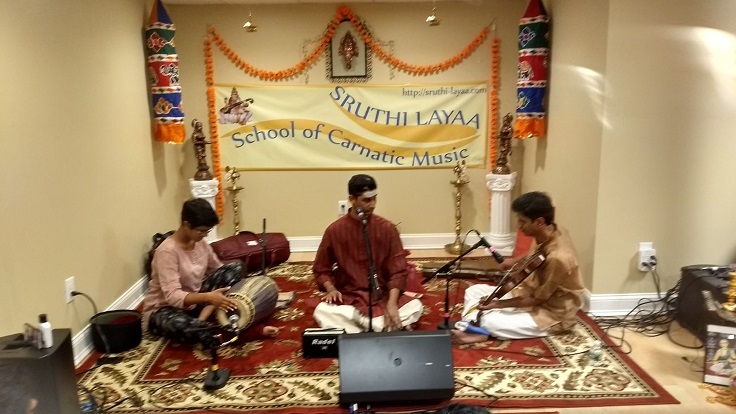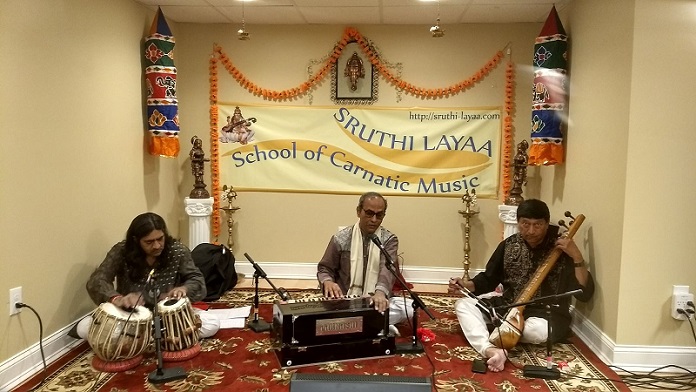Contribute
| KHMC - September 2017 Presentation Delights Audiences |
Shuchita Rao and Mali Santhanakrishnan
09/14/2017
For non-profit organization KHMC’s Fall season 2017 opening
concert, a visiting musician from Kolkata, Shri. Ujjal Banerjee presented a
lecture-demonstration on Rabindra Sangeet in the Hindustani segment. Titled
“Rabindra Sangeet – Beyond Bordersâ€, the lec-dem was held in the beautiful home
of Uma (Founder, Sruthilaya school of Carnatic music) and Sankar Gangaikondan on
Friday, August 25, 2017. Shri Dipankar Deshmukh
on the Esraj and Shri Abhilash Mehta on the tabla provided excellent accompaniment
to Shri. Banerjee. Shri. Ujjal Banerjee has received training in Rabindra
Sangeet from Shri Abhiroop Guhathakurta. He has also had several years of training
in Hindustani Classical vocal music under the Late Krishnadas Ghosh and Pandit
Kamal Banerjee, (direct disciple of the legendary vocalist Ustad Amir Khan of
Indore Gharana), Pandit Usharanjan Mukherjee and Pandit Shrikant Bakhre. Shri Ujjal Banerjee sang more than ten Rabindra Sangeet
compositions that clearly showed how diverse musical influences inspired Tagore’s
creative mind. He created unique compositions styled after Hindustani
classical, semi-classical, Bengali folk, Western and Carnatic music. Explaining
the meaning of the lyrics in English before he sang each composition, he won
hearts by his fluid musical delivery steeped in melody and rhythm. While Tagore’s
compositions were based on popular Hindustani ragas, they were never rigidly
structured within its grammatical structure confines – the poet-musician always
managed to use his brilliant imagination to foray into allied ragas to bring
out the beauty of the lyrics in an evocative manner. Shri Abhilash Mehta played
a variety of rhythm cycles such as Jhampak, Dadra, Keherva and Chautaal and
recited and demonstrated the teevra taal for the benefit of the audience. This
is the key contribution of KHMC music programs – in addition to the
performances, the artists educate the audience about what they present in the
performance. Several music enthusiasts in the audience appreciated the
program and said that they found the lecture interesting and the demonstration
very melodious. One member from the audience spontaneously sang a Purvi Kalyani
composition sharing his insights about Carnatic music influence on a Rabindra
Sangeet composition sung by Shri Banerjee.
In the capacity of Shri Ujjal Banerjee’s student, I sang the popular
Tagore song “Tomar Khola Hawa Lagiye Paleyâ€. Shri Banerjee concluded his
presentation by inviting the audience to sing along with him in an interactive
exercise. The fact that Tagore was
deeply impacted by Indian classical music, Western music as well as the folk
music and vision of baul singers was brought out very well in Shri Ujjal
Banerjee’s presentation. The audience also grasped how well Tagore integrated
the myriad musical influences in his life not only to create unique
compositions but to popularize them within the mainstream musical scene of
Bengal. Tagore’s Rabindra Sangeet has stood the test of time and continues to
delight audiences to this day. Karaikkal Shri R. Jaishankar’s brilliant and pious Carnatic
concert followed Shri Ujjal Banerjee’s mesmerizing presentation. Shri
Jaishankar was accompanied by Shri Kalyan Gopalakrishnan on Violin and Kumari
Rajna Swaminathan on Mridangam. Shri Jaishankar received his training from two legends : late
Kalaimamani Sangeetha Acharya Vairamangalam Sri S. Lakshminarayanan and late
Thiruvengadu Sri A. Jayaraman. Currently, he is continuing his work with the
critically acclaimed vocalist, Sri N. Vijay Siva. Shri Jaishankar started his concert with a beautiful shloka
on Lord Subramanya by Adi Shankaracharya and followed it with the Shri G.N.
Balasubramaniam’s Hamsadhwani composition Vara Vallabha Ramana. After
Harikesanallur Muthaiah Bhagavathar’s brisk Ambavani Nannu in Keeravani ragam, he
presented a crisp alapana in Raga Bilahari. Shri Jaishankar sang Patnam
Subramanya Iyer’s krithi Paridhanamichithe and sprinkled it with some very well
placed kalpana swaras. With his next exploration Shri Jaishankar took the audience
to a trance. Delving into the raga Rasikapriya, the 72nd melakartha,
with such ease and command, he weaved magical patterns with his presentation,
spell binding the listeners. Shri Kalyan matched note for note and showed his
virtuosity and expertise in his solo presentation of Rasikapriya, which was
followed by Koteeswara Iyer’s masterpiece krithi Arul Seyya Vendum Ayya. The main composition of the concert was Saint Thyagaraja’s
Karaharapriya gem Pakkala Nilabadi in Misrachapu Talam (7 beat cycle). Shri
Jaishankar presented an elaborate Karaharpriya alapana and Shri Kalyan followed
it with an exquisite solo on violin. Shri Jaishankar presented the kriti with
all the emotions the composer intended to present with. Kumari Rajana played a
sharp taniavartanam in a mathematically challenging, aesthetically beautiful
spot – 3 mathras after starting point of the cycle – with such ease, fully
embodying the style of her guru, living legend Sangeetha Kalanidhi Umayalpuram
Shri K. Sivaraman. Shri Jaishankar concluded his concert with Mahakavi
Bharathiyar’s Kaani Nilam Vendum, and the traditional Shankarabharanam Thillana
composed by Ponniah Pillai. What we had on the stage was true inspiration. If
the audience closed their eyes and listened to the concert, the audience would
not know Shri Jaishankar was visually challenged or that it was a girl born and
raised in this country that played the mridhangam at such a high level. The inviting ambience, the terrific food and the two amazing
presentations of Rabindra Sangeet and Classical Carnatic enthralled the
audience and made for an incredibly memorable evening of musical enchantment!
You may also access this article through our web-site http://www.lokvani.com/


.jpg)
.jpg)